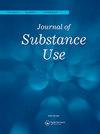情绪智力和应对策略对在韩非洲寻求庇护者广泛性焦虑障碍与酒精使用障碍关系的调节中介作用
IF 0.6
4区 医学
Q4 SUBSTANCE ABUSE
引用次数: 0
摘要
摘要背景韩国移民中广泛性焦虑障碍的患病率较高。对健康行为的影响是一个主要问题。然而,流行病学研究表明,患有广泛性焦虑症的非洲寻求庇护者最常表现出同时发生的酒精使用障碍特征。本研究旨在探讨情绪智力和应对策略对在韩非洲寻求庇护者广泛性焦虑障碍和酒精使用障碍的中介和调节作用。方法采用SPSS PROCESS宏,采用横断面定量调查设计,对302名生活在韩国的非洲寻求庇护者进行问卷调查。对数据进行描述性统计,并使用普通最小二乘路径分析进行有调节的中介分析,以调查所有研究问题。结果研究路径模型拟合良好,支持广泛性焦虑障碍对酒精使用障碍有不利影响,对情绪智力有负面影响的假设。情绪智力在广泛性焦虑障碍与酒精使用障碍之间起中介作用,应对策略在二者之间起调节作用。结论情绪智力和应对策略是帮助非洲寻求庇护者控制焦虑障碍和酒精消费欲望的关键结构。关键词:广泛性焦虑症酒精使用障碍情绪智力应对策略非洲寻求庇护者披露声明作者未报告潜在的利益冲突。数据可用性声明由于技术原因,再现上述发现所需的原始数据目前无法共享,并且它是正在进行的研究的一部分。其他信息资金作者报告没有与本文所述工作相关的资金。本文章由计算机程序翻译,如有差异,请以英文原文为准。
Moderated-mediation effects of emotional intelligence and coping strategy on the relationship between generalized anxiety disorder and alcohol use disorder among African asylum seekers in Korea
ABSTRACTBackground There is a high prevalence of generalized anxiety disorder among immigrants in South Korea. The effect on health behavior is a major concern. However, epidemiological studies suggest that African asylum seekers with generalized anxiety disorders most often manifest co-occurring alcohol use disorder attributes. This study aimed to examine the mediating and moderating effect of emotional intelligence and coping strategies on the generalized anxiety disorder and alcohol use disorder of African asylum seekers in South Korea.Methods Using the SPSS PROCESS macro, a cross-sectional quantitative survey design, self-reported questionnaires were distributed to 302 African asylum seekers living in South Korea. The data was performed with descriptive statistics and moderated mediation analysis using ordinary least squares path analysis to investigate all research problems.Results The study path model showed a good fit and supported the hypothesis that generalized anxiety disorder has a detrimental effect on alcohol use disorder and a negative effect on emotional intelligence. Emotional intelligence was proven to be a mediator, and coping strategies moderated the relationship between generalized anxiety disorder and alcohol use disorder.Conclusions Emotional intelligence and coping strategies are critical constructs to help control African asylum seekers’ anxiety disorders and desire for alcohol consumption.KEYWORDS: Generalized anxiety disorderalcohol use disorderemotional intelligencecoping strategyAfrican asylum seekers Disclosure statementNo potential conflict of interest was reported by the author(s).Data availability statementThe raw data required to reproduce the above findings cannot be shared at this moment due technical reasons and it forms part of an ongoing study.Additional informationFundingThe author(s) reported there is no funding associated with the work featured in this article.
求助全文
通过发布文献求助,成功后即可免费获取论文全文。
去求助
来源期刊

Journal of Substance Use
SUBSTANCE ABUSE-
CiteScore
1.60
自引率
0.00%
发文量
129
期刊介绍:
Journal of Substance Use is a bimonthly international journal, publishing peer-reviewed, up-to-the-minute articles on a wide spectrum of issues relating to the use of legal and illegal substances. The Journal aims to educate, inform, update and act as a forum for standard setting for health and social care professionals working with individuals and families with substance use problems. It also informs and supports those undertaking research in substance use, developing substance use services, and participating in, leading and developing education and training programmes.
 求助内容:
求助内容: 应助结果提醒方式:
应助结果提醒方式:


